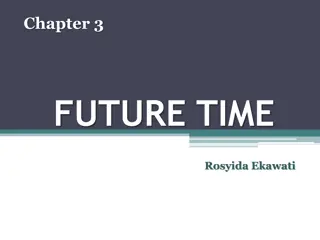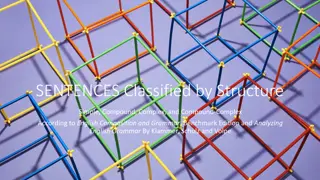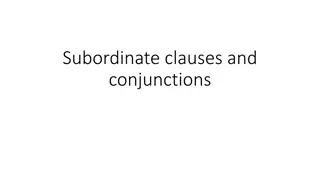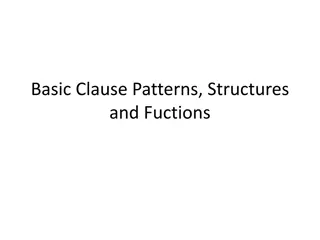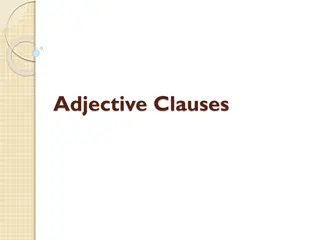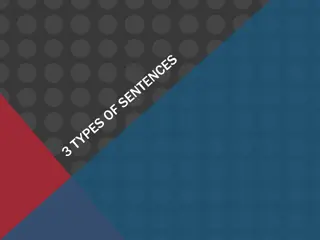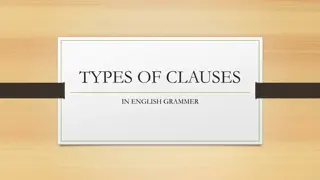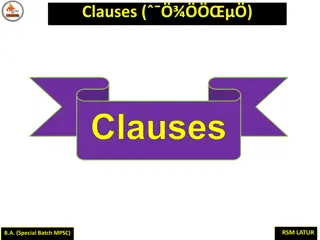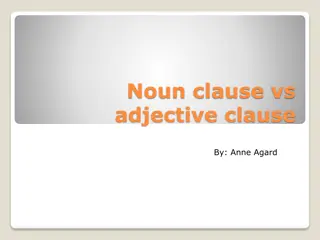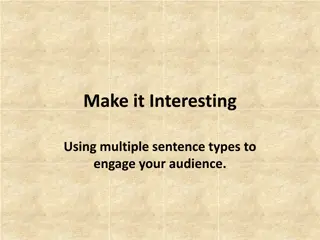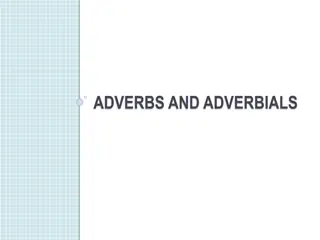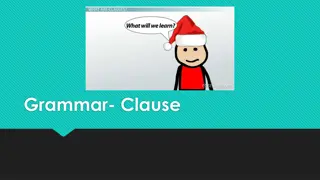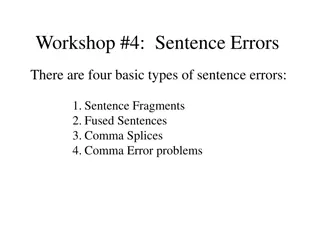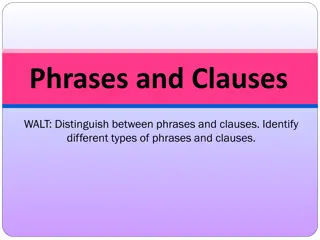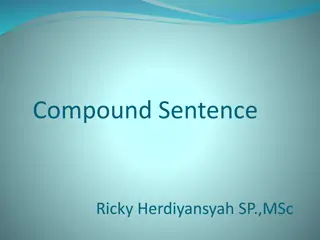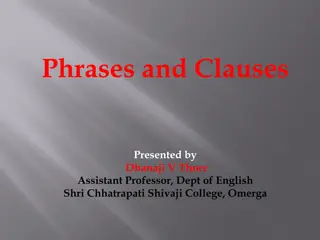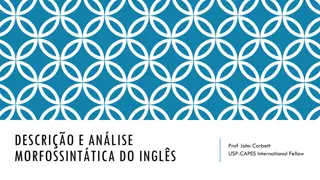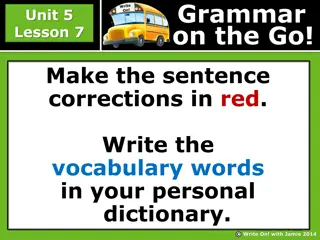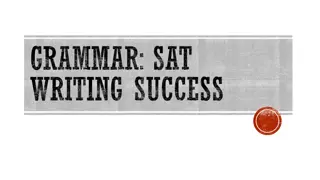Understanding Sentence Structure: Phrases, Clauses, and Compound Sentences
Learn about phrases, clauses, simple sentences, conjunctions, and compound sentences in English grammar. Understand the differences between independent and dependent clauses, how to form compound sentences using conjunctions, and practice writing sentences about Justin Bieber. Explore the components that make up complete sentences and how they combine to convey different types of ideas.
Download Presentation

Please find below an Image/Link to download the presentation.
The content on the website is provided AS IS for your information and personal use only. It may not be sold, licensed, or shared on other websites without obtaining consent from the author. Download presentation by click this link. If you encounter any issues during the download, it is possible that the publisher has removed the file from their server.
E N D
Presentation Transcript
+ Sentence Combining
+Phrases A Phrase is a group of words that is missing a subject, predicate, or both. It is not a complete sentence. Adds detail to the ideas in a sentence Next to the door (prepositional phrase) The cloudless blue sky (noun phrase) To become a rock star (verb phrase)
+Clauses A clause is a group of words that contain a subject and a predicate. Independent Clause: Has a subject and a predicate, expresses a complete idea, can stand alone. It is a complete sentence: Emily ran. Mara sits
+Simple Sentences A simple sentence expresses an idea. It contains one independent clause (subject+main verb). Javier sat beneath the old pine tree. Javier=subject. sat=main verb. This is a simple sentence because it contains just one independent clause. He thought about nature. He=subject. thought=main verb.
+Conjunctions Connect two related independent clauses to create one complete sentence FANBOYS For And Nor But Or Yet So
+Compound Sentences Contains two or more independent clauses; the clauses express related ideas they share common ground. The clauses are joined together by using a comma with a conjunction, or by using a semicolon. For And Nor But Or Yet So (FANBOYS) Javier sat beneath the old pine tree, and he thought about nature. Two independent clauses are joined together with a comma and the coordinating conjunction, and Javier sat beneath the old pine tree; he thought about nature. Javier sat beneath the old pine tree; he thought about nature, and he pondered his place in the universe. In this example, three independent clauses are joined together.
+Practice Write 5 simple sentences about Justin Bieber. Next, combine some of those ideas to create 4 compound sentences.
+Clauses A clause is a group of words that a subject and a predicate. Independent Clause: Has a subject and a predicate, expresses a complete idea, can stand alone. It is a complete sentence: Emily ran. Mara sits
+Clauses A Dependent clause also has a subject and a predicate, but it can t stand alone because it begins with a subordinating word. They must be linked to an independent clause in order to create a complete sentence. Although Emily runs, Because Mara sat,
+Subordinating words Connect a dependent clause to a related independent clause to create a complete sentence after although as because before even if even though if that though in order that once provided that rather than since so that than unless until when whenever where whereas wherever whether while why
+ Complex Sentences Contains one independent clause, and one or more dependent clauses. The dependent clause begins with a subordinating word and may be placed before or after the independent clause. A comma follows the dependent clause if it comes first. As Javier sat beneath the old pine tree, he thought about nature. the subordinating word as changes the independent clause into a dependent clause. Javier sat beneath the old pine tree while he thought about nature. In this example the independent clause comes first, followed by the dependent clause.
+ Compound-Complex Sentences Contains two or more independent clauses and one or more dependent clauses. As Javier sat beneath the old pine tree, he thought about nature, and he pondered his place in the universe. Dependent clause+independent+independent Javier sat beneath the old pine tree; he thought about nature while he pondered his place in the universe . Independent+independent+dependent
+Practice: Identify each clause as dependent, independent, or not a clause. Although I want to go to Circle K To the store Alejandra claims That Edgar needs Jesus
+Practice Identify each sample sentence as simple, compound, complex, or compound-complex Maria created a resume, and she printed it on expensive, high quality paper. More students at the college are biking, walking, or carpooling because the price of gasoline is continuing to rise. Because the price of gasoline is continuing to rise, more students at the college are biking, walking, or carpooling.
+Practice copy and identify each sample sentence as simple, compound, complex, or compound-complex To this day, there is much controversy surrounding 9/11, and the American politicians swear they knew nothing about the attack. Compound (independent clause + independent clause) The book that Jonathan read is on the shelf. Complex (that Jonathan read=dependent clause) I prefer potato chips; he d rather nosh on tortilla chips. Compound (2 simple sentences joined with a semicolon) I want to go to Forever 21 on Super Bowl Sunday; however, my boyfriend would rather stay home and watch the Patriots play the Seahawks. Complex (independent clause + dependent clause)
+Practice copy and identify each sample sentence as simple, compound, complex, or compound-complex Emily wants to go to London, and Betsy wants to go to Ireland although their parents can afford neither. Compound-Complex (Combines 2 independent clauses and 1 dependent clause) The extra coffee grounds at Starbucks can be found under the sink. Simple (1 subject 1 verb) Harry and Ron practice for Quidditch while Hermione studies for hours in the library. Complex (independent + dependent)
+Sentence Kernels combine the sentence kernels below to write 2 compound sentences. Tucker was a trucker. He was out of luck. He was in Winnemucca. He was stuck.
+Self-Check Do both sentences have 2 independent clauses? Box them. Circle the coordinating conjunction/semi-colon.
+Self-Check 1. Does each sentence have an independent clause? Box it. 2. Does each sentence have at least one dependent clause introduced by a subordinating word? Underline the dependent clause twice and place a triangle over the subordinating word. 3. Does each sentence start with a capital letter? 4. Does each sentence end with punctuation?
+Practice write 5 compound-complex sentences about zombies.
+Self-Check 1. Does your sentence have at least 2 independent clauses? Underline them. 2. Are your sentences joined by a conjunction? Draw a box around it. 3. Does your sentence have a dependent clause? Circle it. 4. Does your dependent clause start with a subordinating word? Box it.


